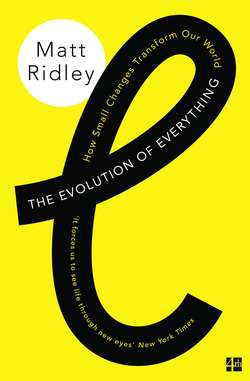Читать книгу The Evolution of Everything: How Small Changes Transform Our World - Matt Ridley, Matt Ridley - Страница 16
Better angels
ОглавлениеGood grief. Here is an eighteenth-century, middle-class Scottish professor saying that morality is an accidental by-product of the way human beings adjust their behaviour towards each other as they grow up; saying that morality is an emergent phenomenon that arises spontaneously among human beings in a relatively peaceful society; saying that goodness does not need to be taught, let alone associated with the superstitious belief that it would not exist but for the divine origin of an ancient Palestinian carpenter. Smith sounds remarkably like Lucretius (whom he certainly read) in parts of his Moral Sentiments book, but he also sounds remarkably like Steven Pinker of Harvard University today discussing the evolution of society towards tolerance and away from violence.
As I will explore, there is in fact a fascinating convergence here. Pinker’s account of morality growing strongly over time is, at bottom, very like Smith’s. To put it at its baldest, a Smithian child, developing his sense of morality in a violent medieval society in Prussia (say) by trial and error, would end up with a moral code quite different from such a child growing up in a peaceful German (say) suburb today. The medieval person would be judged moral if he killed people in defence of his honour or his city; whereas today he would be thought moral if he refused meat and gave copiously to charity, and thought shockingly immoral if he killed somebody for any reason at all, and especially for honour. In Smith’s evolutionary view of morality, it is easy to see how morality is relative and will evolve to a different end point in different societies, which is exactly what Pinker documents.
Pinker’s book The Better Angels of Our Nature chronicles the astonishing and continuing decline in violence of recent centuries. We have just lived through the decade with the lowest global death rate in warfare on record; we have seen homicide rates fall by 99 per cent in most Western countries since medieval times; we have seen racial, sexual, domestic, corporal, capital and other forms of violence in headlong retreat; we have seen discrimination and prejudice go from normal to disgraceful; we have come to disapprove of all sorts of violence as entertainment, even against animals. This is not to say there is no violence left, but the declines that Pinker documents are quite remarkable, and our horror at the violence that still remains implies that the decline will continue. Our grandchildren will stand amazed at some of the things we still find quite normal.
To explain these trends, Pinker turns to a theory first elaborated by Norbert Elias, who had the misfortune to publish it as a Jewish refugee from Germany in Britain in 1939, shortly before he was interned by the British on the grounds that he was German. Not a good position from which to suggest that violence and coercion were diminishing. It was not until it was translated into English three decades later in 1969, in a happier time, that his theory was widely appreciated. Elias argued that a ‘civilising process’ had sharply altered the habits of Europeans since the Middle Ages, that as people became more urban, crowded, capitalist and secular, they became nicer too. He hit upon this paradoxical realisation – for which there is now, but was not then, strong statistical evidence – by combing the literature of medieval Europe and documenting the casual, frequent and routine violence that was then normal. Feuds flared into murders all the time; mutilation and death were common punishments; religion enforced its rules with torture and sadism; entertainments were often violent. Barbara Tuchman in her book A Distant Mirror gives an example of a popular game in medieval France: people with their hands tied behind their backs competed to kill a cat nailed to a post by battering it with their heads, risking the loss of an eye from the scratching of the desperate cat in the process. Ha ha.
Elias argued that moral standards evolved; to illustrate the point he documented the etiquette guides published by Erasmus and other philosophers. These guides are full of suggestions about table manners, toilet manners and bedside manners that seem unnecessary to state, but are therefore revealing: ‘Don’t greet someone while they are urinating or defecating … don’t blow your nose on to the table-cloth or into your fingers, sleeve or hat … turn away when spitting lest your saliva fall on someone … don’t pick your nose while eating.’ In short, the very fact that these injunctions needed mentioning implies that medieval European life was pretty disgusting by modern standards. Pinker comments: ‘These are the kind of directives you’d expect a parent to give to a three-year-old, not a great philosopher to a literate readership.’ Elias argued that the habits of refinement, self-control and consideration that are second nature to us today had to be acquired. As time went by, people ‘increasingly inhibited their impulses, anticipated the long-term consequences of their actions, and took other people’s thoughts and feelings into consideration’. In other words, not blowing your nose on the tablecloth was all one with not stabbing your neighbour. It’s a bit like a historical version of the broken-window theory: intolerance of small crimes leads to intolerance of big ones.
